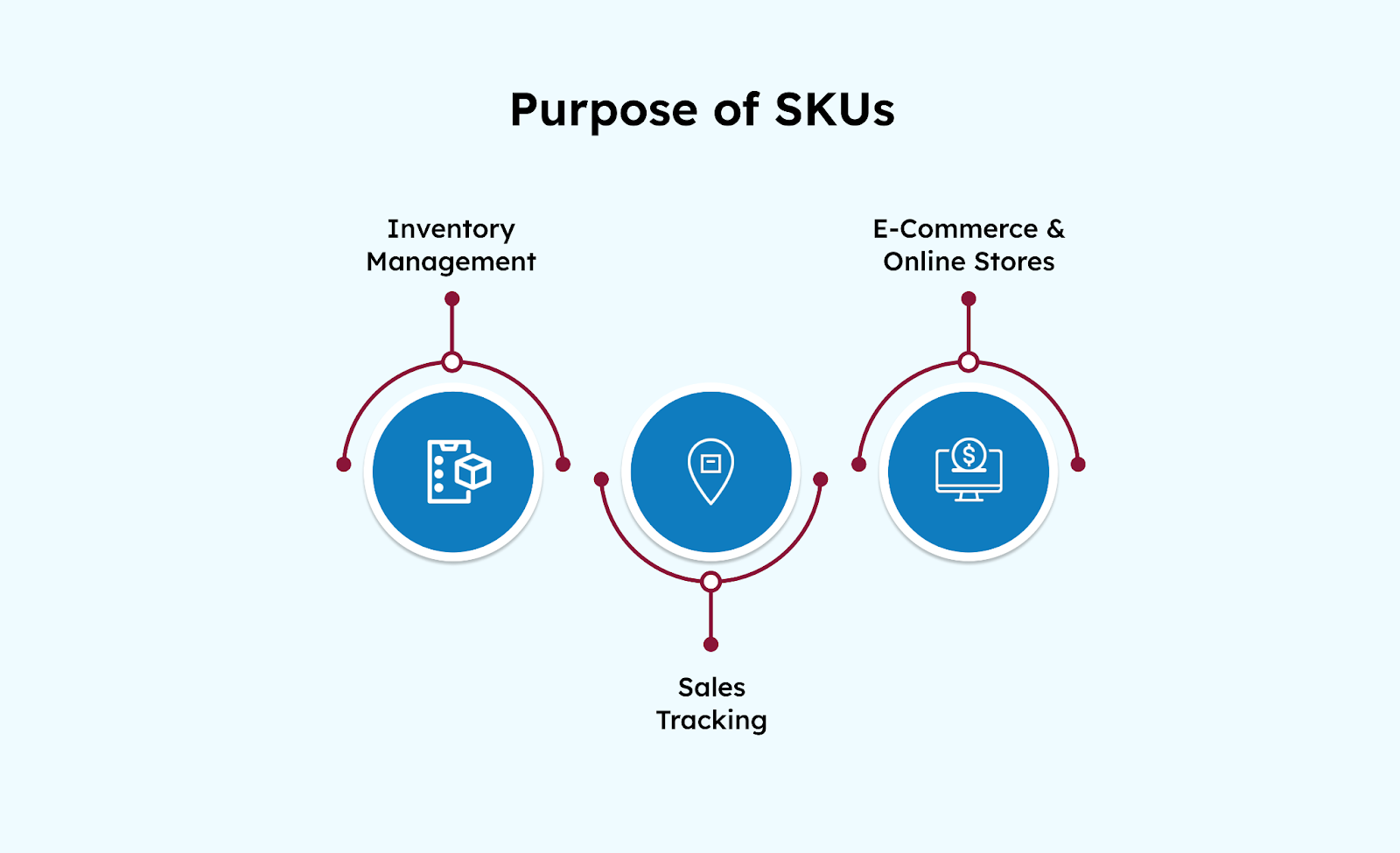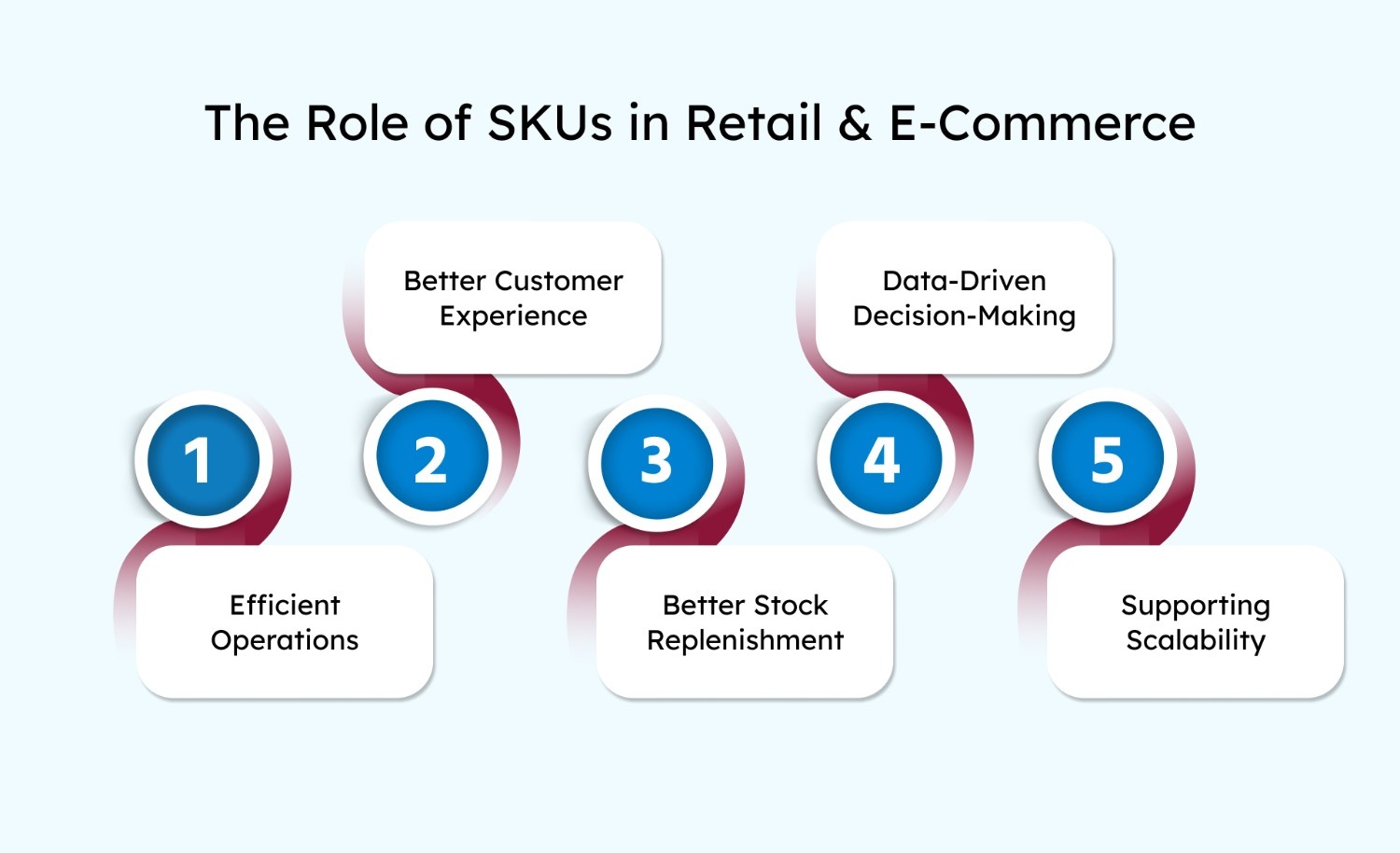How ready is your logistics process to meet the future of e-commerce?
Have you ever ordered something online, only to find out it’s out of stock after you’ve already paid for it? Or worse, you get the wrong item altogether. In a world where inventory accuracy is crucial, businesses can’t afford these kinds of mistakes. That’s where SKUs (Stock Keeping Units) come in.
According to a study involving seven of Europe's largest retailers, correcting inventory inaccuracies led to a 4% to 8% increase in sales.
In fact, research indicates that 60% of SKUs analysed were affected by inventory record inaccuracies. But how exactly do SKUs work, and why are they so essential for businesses, whether they’re operating a physical store or an e-commerce platform?
In this article, we’ll look into what SKUs are, why they matter, and how using them properly can transform your inventory management, improve customer satisfaction, and streamline your overall operations.
What Does SKU Mean?
A SKU (Stock Keeping Unit) is a unique identifier used to track products in a store, warehouse, or inventory system. Think of it as a barcode or a unique code that helps retailers and businesses quickly identify, locate, and manage individual products in their inventory.
Each SKU is specific to a particular product and is usually made up of a combination of letters and numbers. These characters are used to represent different details about the product, such as:
- Product Type: This indicates what kind of item it is, such as a "T-shirt" or "Laptop."
- Size: For apparel or other size-specific items, the SKU might include "S" (small), "M" (medium), or "L" (large).
- Colour: This can be a shorthand for the colour of the item, such as "RED" or "BLK" for black.
- Brand: Some SKUs include the brand, like "NIKE" or "SONY," to help identify the manufacturer.
- Model Number: A unique number for the specific model of the product.
Example: A SKU like TSHIRT-RED-M-001 can be broken down as:
- TSHIRT: Product category (T-shirt)
- RED: Colour
- M: Size (Medium)
- 001: Unique identifier for this specific product
With a clear understanding of what SKUs represent, it’s important to know how they compare to other identifiers, such as UPCs, barcodes, and GTINs, and what makes them unique for internal inventory management.
SKU vs. Other Product Identifiers
Understanding the difference between SKUs and other product identifiers is essential for businesses looking to manage inventory efficiently. Here’s how SKUs stack up against other commonly used identifiers:
1. Universal Product Codes (UPCs)
UPCs are standardised 12-digit barcodes used globally to identify products at the point of sale. They are assigned to products by manufacturers and remain consistent across all retailers.
- Key Difference: Unlike SKUs, UPCs are universal. They’re the same wherever the product is sold, whether it’s at Walmart, Amazon, or any other retailer. This makes UPCs useful for standardised product identification but not for detailed internal management or tracking.
2. Barcodes
Barcodes are visual representations of data (like UPCs or SKUs) that can be scanned to retrieve product information. Essentially, barcodes are the machine-readable version of SKUs and UPCs.
- Key Difference: A barcode is simply the representation of a SKU or UPC in a scannable format. SKUs contain more specific details about products tailored to individual businesses, while barcodes serve as a physical encoding tool for both SKUs and UPCs.
3. Global Trade Item Numbers (GTINs)
GTINs are global identifiers used for trade items, which include UPCs, EANs, and other product identification systems. The GTIN ensures global standardisation, making it easier for businesses across different countries and regions to identify and trade products.
- Key Difference: GTINs are similar to UPCs in that they offer a global product identification. However, GTINs cover more codes (like EANs) and are larger (can range from 8 to 14 digits), while SKUs are unique to individual businesses and often contain more product-specific information.
Purpose of SKUs

Now that we've clarified the distinctions between SKUs and other identifiers, let’s look at how SKUs function in real-world scenarios and how they contribute to your inventory management system:
1. Inventory Management
In warehouses and stores, SKUs are crucial for managing and organising inventory. They allow businesses to:
- Track Stock Levels: SKUs make it easy to monitor how many units of a product are available. If stock is low, businesses can reorder more without delays.
- Manage Stock Efficiently: When SKUs are assigned to products, businesses can organise products on shelves, making it easier to locate and retrieve items quickly.
- Prevent Errors: By scanning SKUs with a barcode scanner or an automated system, businesses can reduce human error in inventory tracking.
2. Sales Tracking
SKUs are also vital for tracking sales data. By analysing sales for specific SKUs, businesses can:
- Monitor Product Performance: Identify which products are performing well and which aren’t, helping businesses make data-driven decisions.
- Understand Consumer Trends: SKUs allow businesses to analyse trends in purchasing behaviour, helping them adjust marketing or promotional efforts.
3. E-Commerce and Online Stores
For online businesses, SKUs help ensure product accuracy in listings and orders. When customers purchase products online, SKUs make it easier to:
- Match Product Listings: Each SKU represents a unique product, ensuring that the correct product is shown in an online store.
- Streamline Fulfilment: SKUs help warehouse employees quickly find the correct item for packaging and shipping, improving the efficiency of order fulfilment.
As we’ve seen, SKUs are fundamental for inventory management. Let’s explore their role in enhancing operations and customer experiences, especially in retail and e-commerce environments.
The Importance of SKUs in Retail and E-Commerce

A well-structured SKU system is the backbone of smooth business operations. By offering a clear, organised approach to managing inventory, SKUs help businesses stay efficient, reduce errors, and enhance the overall customer experience. Let’s explore the specific benefits:
1. Efficient Operations
Using SKUs helps businesses streamline operations by allowing staff to locate products, manage stock, and process orders quickly. Whether you’re running a physical store, a warehouse, or an online shop, SKUs ensure smooth transactions and effective inventory control.
- In Retail Stores: SKUs help sales associates quickly find the exact item a customer is looking for, whether it’s a size medium red t-shirt or a wireless headphone from a particular brand.
- In Warehouses: SKUs are critical for the quick picking and packing of products. This reduces the time spent searching for items and accelerates order fulfilment, contributing to faster shipping.
2. Improved Customer Experience
An organised SKU system directly enhances customer satisfaction. When a business uses SKUs to manage inventory accurately, customers are more likely to receive the correct products quickly.
- Accurate Orders: When products are correctly identified and tracked, the chances of shipping errors decrease. This means customers receive exactly what they ordered, on time.
- Better Delivery Times: Faster order picking and packing (enabled by SKUs) means quicker shipping, and customers appreciate prompt deliveries.
3. Better Stock Replenishment
Efficient use of SKUs also enables businesses to monitor inventory levels in real-time and anticipate restocking needs.
- Tracking Popular Items: SKUs enable easier identification of products that are selling quickly and require restocking. This helps businesses avoid stockouts (when a product is out of stock) and keep customers happy by ensuring popular items are always available.
- Avoiding Overstocking: On the flip side, SKUs also help businesses avoid overstocking products that aren’t selling well, which can tie up capital and lead to unnecessary markdowns.
4. Enhanced Data Analysis for Decision-Making
Beyond logistics and inventory, SKUs provide valuable insights into sales trends and customer preferences. By analysing SKU data, businesses can identify:
- Which Products are Top-Sellers: This helps businesses optimise their product offerings and promotions.
- Slow-Moving Products: SKUs highlight which products are not selling as quickly, enabling businesses to rethink marketing strategies or adjust prices.
5. Supporting Scalability
As businesses grow, so do their inventory and logistics needs. A well-implemented SKU system supports scalability by ensuring that additional products can be added to the system without overwhelming the existing infrastructure. This is particularly important for e-commerce platforms or companies expanding their product lines.
- Adding New Products: As businesses introduce new products, they can easily assign new SKUs without disrupting existing operations. This makes it simpler to integrate new products into a growing inventory system.
- Growth in Online Sales: For online businesses, SKUs play a crucial role in managing expanded product offerings and ensuring consistent, accurate listings.
Now that we understand the importance of SKUs in retail and e-commerce, let's get into how they work across different environments, from warehouses to online stores.
How SKUs Work in Various Environments
SKUs serve as a foundational tool for inventory management across different retail and logistics environments. Their functionality adapts depending on the operational needs of warehouses, retail stores, and e-commerce platforms. Let's explore how they work in each of these settings:
1. Warehouses: Optimising Space and Reducing Costs
In warehouses, SKUs play a pivotal role in organising products, optimising storage space, and ensuring efficient retrieval. With thousands of items stored in a single facility, SKUs help workers quickly identify and locate products, reducing the time spent searching for items.
- Efficient Space Utilisation: SKUs enable the precise organisation of goods by categorising them based on attributes such as size, type, and demand. For example, high-demand products might be placed in easily accessible areas, reducing travel time within the warehouse.
- Cost Reduction: Efficient SKU management helps reduce unnecessary labour costs. With automated picking systems and barcode scanning, businesses can expedite the picking process, minimise human error, and enhance productivity.
2. Retail Stores: Streamlining Operations and Enhancing Customer Experience
In physical retail stores, SKUs enable businesses to organise products on shelves, track inventory levels, and streamline stock replenishment. With well-structured SKUs, store employees can quickly locate products, ensuring that customers can easily find what they’re looking for.
- Inventory Visibility: SKUs help employees quickly spot when stock is low and when a product needs to be reordered, preventing out-of-stock situations that could frustrate customers.
- Simplified Stock Replenishment: Store managers use SKUs to determine which items need restocking based on sales data linked to each SKU. This ensures that shelves remain stocked with the most popular products.
3. E-commerce Platforms: Synchronising Inventory and Improving Efficiency
For online retailers, SKUs are essential for managing product listings, synchronising inventory across multiple sales channels, and streamlining order processing. E-commerce platforms rely on real-time data from SKUs to ensure that inventory levels are accurate and orders are fulfilled without errors.
- Inventory Synchronisation: With integrated SKU systems, businesses can update inventory across all platforms automatically. For example, if a product is sold through a physical store or on a different marketplace, the SKU system ensures the stock is updated instantly across all channels, preventing overselling.
- Order Processing Efficiency: By linking SKUs to the order fulfilment system, businesses can expedite the process of picking, packing, and shipping orders, thereby reducing lead times and enhancing customer satisfaction.
While SKUs are critical for smooth inventory management, there are some common pitfalls businesses should avoid. Let’s take a look at the mistakes you need to watch out for.
Common Mistakes to Avoid with SKUs

SKUs are essential for smooth inventory management, but improper use or management of SKUs can lead to operational challenges and inefficiencies. Here are some common mistakes businesses should avoid when using SKUs:
1. Inconsistent SKU Systems
One of the most common mistakes is creating inconsistent SKUs for similar products or across different product categories. A lack of uniformity can confuse, making it difficult for staff to locate products quickly, track inventory levels accurately, and even confuse customers about product availability.
2. Not Updating SKUs
If a business changes a product’s size, colour, or model but fails to update the SKU, it can lead to incorrect inventory tracking, delays in order fulfilment, and miscommunication with suppliers or customers.
Regularly review and update SKUs when products are modified, including new sizes, colours, packaging, or other changes. Keeping SKUs up to date ensures that your system remains accurate and reliable.
3. Ignoring SKU Data
While SKUs are primarily used for tracking inventory, they can also provide valuable insights into sales trends, customer preferences, and overall business performance. Ignoring SKU data means missing out on these valuable insights, which could otherwise guide inventory decisions, pricing strategies, and marketing campaigns.
4. Overcomplicating SKU Formats
While it’s important to be descriptive, overcomplicating the SKU format can lead to confusion, especially as businesses scale and add more products to their inventory. Creating overly long or detailed SKUs makes them harder to manage and increases the likelihood of errors.
5. Failing to Train Staff on SKU Use
Even with an excellent SKU system, if staff aren’t properly trained on how to use SKUs effectively, errors and inefficiencies can arise. Employees who aren’t familiar with SKU structures might make mistakes when picking products or updating inventory systems.
To avoid these pitfalls, let's now look at the best practices for SKU management. By following these guidelines, businesses can maximise the benefits of SKUs and enhance their operational efficiency.
Best Practices for SKU Management
Effective SKU management plays a crucial role in optimising warehouse operations, ensuring accurate inventory tracking, and enhancing overall business efficiency. By following these best practices, businesses can maintain a process that reduces errors and improves the customer experience. To maximise the effectiveness of SKUs:
- Ensure Clarity and Specificity: Design SKUs to reflect product details, reducing errors in product identification clearly.
- Implement a Scalable System: Create an adaptable SKU system that can grow with your product range.
- Automate SKU Tracking: Use automated systems and barcode scanning to minimise errors and ensure real-time updates.
- Maintain Consistency: Standardise SKU formats to ensure uniformity and ease of tracking.
- Monitor SKU Performance: Regularly analyse sales and inventory data to adjust stock levels and avoid overstocking or stockouts.
Now that we've covered the importance and best practices for managing SKUs, let's look at how a solution like WareOne can streamline your logistics and warehousing to make the most of your SKU system.
WareOne: Your One-Stop Solution for Streamlined Logistics and Warehousing
At WareOne, we offer a comprehensive, flexible solution for managing logistics and warehousing. Our services streamline your supply chain, ensuring efficiency, scalability, and cost savings across every stage. Here's how WareOne enhances your logistics operations:
- Dynamic Storage Options: Need extra space during peak seasons or for new product lines? WareOne adjusts your storage capacity based on demand, reducing overhead while optimising efficiency. Integrated systems provide live updates, allowing you to track stock and product movement in real-time, ensuring seamless inventory control.
- Save up to 30%: Compared to traditional full-load logistics, WareOne offers significant cost savings, ensuring you only pay for what you use. No more unnecessary expenses.
- Fast & Hassle-Free Booking: WareOne enables quick and reliable truck booking, eliminating brokers and delays. Get your shipments moving without hassle and at optimal speeds.
- Safe and Reliable Shipment Service: WareOne ensures no hidden fees. With one simple invoice, you can count on transparent pricing for all your shipments, offering peace of mind that your logistics costs are clear and predictable.
- Nationwide Coverage: WareOne provides extensive coverage across locations in the GCC, ensuring you have access to a wide network of trusted partners, no matter where your operations are based in the region.
- Track Your Shipment: Stay informed with precise tracking details, knowing exactly where your shipment is throughout the entire process.
- Scalable Solutions for Business Growth: As your business grows, your logistics needs evolve. WareOne provides scalable logistics solutions that can handle changes in demand, new product offerings, and increased order volume.
WareOne offers the flexibility and efficiency your business needs to optimise logistics and warehousing operations. From fast deliveries to transparent pricing and nationwide coverage, we provide the solutions that support your business's growth while keeping costs low.
Wrapping Up
SKUs are more than just codes; they are integral to efficient inventory management, sales tracking, and operational success. By understanding and implementing effective SKU systems, businesses can enhance accuracy, improve customer satisfaction, and drive profitability.
WareOne is your complete logistics partner. With our flexible warehousing, real-time inventory management, and automated order fulfilment, we ensure that your business can scale efficiently and meet customer expectations at every stage of the supply chain.
No matter the size of your business or the complexity of your logistics needs, WareOne has the tools, technology, and expertise to help you succeed.
Get in touch with WareOne today to discover how we can streamline your logistics operations and help you grow with confidence.
.jpg)